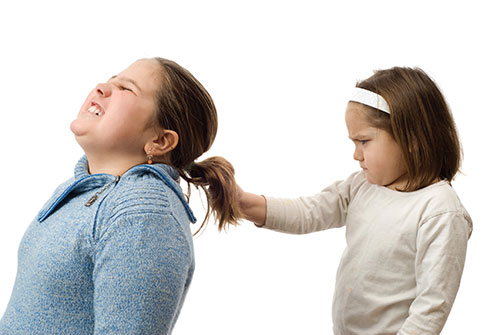Taming Your Child’s Aggression
 Some aggressive behavior is a typical part of child development, especially between the ages of 3 and 9.
Some aggressive behavior is a typical part of child development, especially between the ages of 3 and 9.
Children will often use aggressive actions to communicate strong feelings they can't adequately convey due to their limited verbal and reasoning skills. Understanding how to respond to and minimize your child's aggression can teach him or her how to communicate positively and help prevent future outbursts.
Aggressive Behaviors
Aggressive behaviors can change as a child grows and develops. Some common aggressive behaviors a child may display include:
-
Biting or pinching
-
Playing rough with others
-
Screaming and yelling
-
Hitting others or self
-
Throwing objects
Responding to Aggression
For parents who are seeing frequent aggression in their child, Boys Town parenting experts recommend:
-
Step 1: Observing. Watch your child during aggressive outbursts and see if there is a pattern of behavior that occurs before his or her actions.
-
Step 2: Heading off aggression. Reduce your child's aggression by setting expectations for appropriate behavior, providing clear and consistent consequences, and praising nonaggressive behaviors.
-
Step 3: Responding. If your child becomes aggressive, it is important to stop the behavior, give consequences and follow through on them.
-
Step 4: Recognizing and praising good behavior. Reward and praise your child when he or she uses words rather than aggressive actions when frustrated. It is important that you help your child identify triggers that lead to his or her aggressive behaviors and prompt him or her to calm down and cool down when upset. These strategies help build awareness and improve your child's ability to regulate his or her emotions and reduce aggression.
 Minimizing Misbehavior
Minimizing Misbehavior
As much as possible, parents are encouraged to stay consistent in their discipline when addressing their child's aggressive behavior. A few techniques you can use when responding to aggressive behavior include:
-
Keeping yourself cool and calm
-
Minimizing “high risk" situations that can lead your child to use aggressive behaviors
-
Avoiding negotiation (don't argue or explain too much)
-
Teaching alternative positive behaviors
-
Setting clear expectations for your child's behavior
Additional Resources
-
Show Me Your Mad Face: Teaching Children to Feel Angry Without Losing Control by Connie J. Schnoes, Ph.D.
-
What to Do When Your Temper Flares: A Kid's Guide to Overcoming Problems with Anger by Dawn Huebner, Ph.D.
Download Printable Version
Kid Tips;Communication Skills
